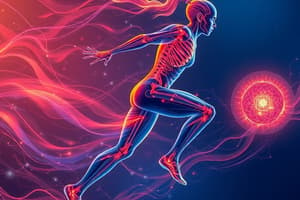Podcast
Questions and Answers
In biomechanics, how are kinetics and kinematics best described in terms of their relationship?
In biomechanics, how are kinetics and kinematics best described in terms of their relationship?
- Unrelated, as kinetics applies to external forces and kinematics to internal forces.
- Antonymous, as they represent opposing aspects of motion.
- Synonymous, as they both describe motion.
- Related but distinct; kinetics concerns forces causing motion, while kinematics describes motion itself. (correct)
Which of the following is the MOST crucial bony and soft tissue structure for the stability of the glenohumeral joint?
Which of the following is the MOST crucial bony and soft tissue structure for the stability of the glenohumeral joint?
- The articulation of the radius and ulna, supported by the interosseous membrane.
- The acromioclavicular joint with support from the acromioclavicular and coracoclavicular ligaments.
- The articulation of the humerus within the glenoid fossa, supported by the rotator cuff tendons and glenoid labrum. (correct)
- The distal radioulnar joint, maintained by the triangular fibrocartilage complex (TFCC).
A patient with weak quadriceps requires exercise. Which type of exercise is MOST appropriate and why?
A patient with weak quadriceps requires exercise. Which type of exercise is MOST appropriate and why?
- Passive exercise, to reduce stress on the weakened muscles.
- Plyometric exercise, to quickly build explosive power in the legs.
- Isometric exercise, to maintain muscle tone without joint movement initially.
- Active exercise, to strengthen the quadriceps through muscle contraction. (correct)
A weightlifter is experiencing pain in their shoulder during the overhead press. Which biomechanical factor is MOST likely contributing to their pain?
A weightlifter is experiencing pain in their shoulder during the overhead press. Which biomechanical factor is MOST likely contributing to their pain?
During a push-up, what type of muscle contraction is primarily occurring in the pectoral muscles as the body moves downwards from the plank position?
During a push-up, what type of muscle contraction is primarily occurring in the pectoral muscles as the body moves downwards from the plank position?
Flashcards
Kinetics vs. Kinematics
Kinetics vs. Kinematics
Kinetics deals with the forces that cause movement, while kinematics describes the motion itself without considering forces. They are not synonymous as they represent different aspects of motion analysis.
Shoulder Joint Stability
Shoulder Joint Stability
The shoulder joint's stability relies on the glenoid fossa (shallow socket) of the scapula articulating with the head of humerus, along with the rotator cuff muscles, glenoid labrum, and ligaments.
Exercise for weak quadriceps
Exercise for weak quadriceps
I will recommend active exercises because those will engage the patient's own muscles to improve strength and function, promoting muscle hypertrophy and neuromuscular control, while passive exercises are mainly for maintaining range of motion.


